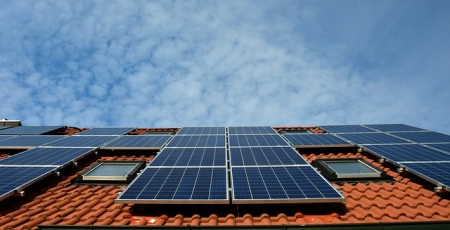VAT hike puts brakes on home solar and batteries

|
On Monday June 24, less than two weeks after outgoing Prime Minster Theresa May declared that the UK will achieve its new ‘Net Zero Carbon’ goal by 2050, a jubilant renewable energy industry was quickly pulled back down to earth. HMRC announced that, from October 1, 2019, VAT on home solar PV and solar-battery systems will increase sharply from 5% to 20%.
The PM’s net zero announcement positioned the UK as a world leader in the fight against climate change. This latest move, however, somewhat contradicts that commitment. It could also further destabilise the UK’s renewable energy industry, which was left wounded by the recent removal of the Feed-in Tariff.
Our net zero commitment still stands, of course, and it is still expected to herald more de-centralised renewable energy installations and accelerate the electrification of infrastructure, but the transition to a carbon-free future will be hampered by this VAT hike.
The labour component of solar and battery installations – the cheapest part – will remain taxed at 5%. The new rate will apply to material costs, which in general are the most expensive part of an installation. This will most likely have a negative effect on a key part of the energy mix needed to balance the grid and enable more ‘self-consumption’ by members of the public. Meanwhile (and worryingly for our net zero target), VAT rates for home gas and coal supplies will remain at 5%.
It is disappointing that, despite clear and definitive guidance from the Committee on Climate Change, and overwhelming consensus in the scientific community (and in the general population), the government still went ahead with this decision.
The official rationale is that, according to EU law ruled in 2015, the discounted tax rate was illegal to begin with. However, the government did not enact any changes to the VAT rate at the time, and the European Court of Justice has since published a VAT action plan (2016) without comment on solar power. It is perhaps telling that the new rates are due to come into effect the same month that the UK is to leave the EU.
ECA will continue to encourage government to make it clear how it intends to support industry in making the shift to a carbon-free future, and will continue to recommend actions that work for the benefit of both business and the environment.
[edit] About this article
This article was written by Luke Osborne, ECA Energy and Emerging Technologies Solutions Advisor. It was previously published on the website of the ECA in June 2019 and can be accessed here.
[edit] Related articles on Designing Buildings Wiki
- Battery energy storage systems with grid-connected solar photovoltaics BR 514.
- BRE National Solar Centre.
- BRE photovoltaic certification scheme.
- Code of practice for grid connected solar photovoltaic systems.
- Future of electricity in domestic buildings.
- Installation of photovoltaic panels on existing flat roofs - some lessons learned IP 8 14.
- Large scale solar thermal energy.
- Microgeneration.
- Micro-grid.
- Renewable energy sources: how they work and what they deliver: Part 4: Solar thermal hot water systems DG 532 4.
- Solar Squared.
- Solar thermal systems.
- Tau - the solar powered island.
- Wind loads on roof-mounted photovoltaic and solar thermal systems DG 489.
--ECA
Featured articles and news
Managing building safety risks
Across an existing residential portfolio, a client's perspective.
ECA support for Gate Safe’s Safe School Gates Campaign.
Core construction skills explained
Preparing for a career in construction.
Retrofitting for resilience with the Leicester Resilience Hub
Community-serving facilities, enhanced as support and essential services for climate-related disruptions.
Some of the articles relating to water, here to browse. Any missing?
Recognisable Gothic characters, designed to dramatically spout water away from buildings.
A case study and a warning to would-be developers
Creating four dwellings... after half a century of doing this job, why, oh why, is it so difficult?
Reform of the fire engineering profession
Fire Engineers Advisory Panel: Authoritative Statement, reactions and next steps.
Restoration and renewal of the Palace of Westminster
A complex project of cultural significance from full decant to EMI, opportunities and a potential a way forward.
Apprenticeships and the responsibility we share
Perspectives from the CIOB President as National Apprentice Week comes to a close.
The first line of defence against rain, wind and snow.
Building Safety recap January, 2026
What we missed at the end of last year, and at the start of this...
National Apprenticeship Week 2026, 9-15 Feb
Shining a light on the positive impacts for businesses, their apprentices and the wider economy alike.
Applications and benefits of acoustic flooring
From commercial to retail.
From solid to sprung and ribbed to raised.
Strengthening industry collaboration in Hong Kong
Hong Kong Institute of Construction and The Chartered Institute of Building sign Memorandum of Understanding.
A detailed description from the experts at Cornish Lime.























